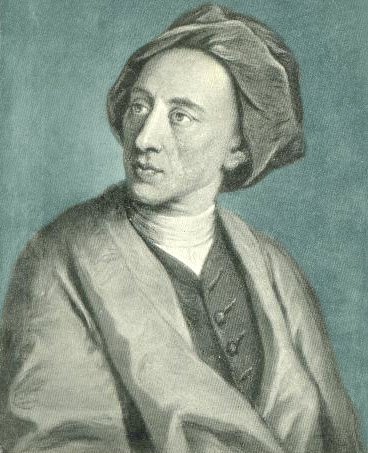
In this letter, the young Alexander Pope—poet, wit, and translator—writes to Henry Cromwell, an early friend and editor. Cromwell, the older of the two, was a fashionable socialite and womanizer, as well as something of a writer himself. Described by a contemporary source as a “louche boulevardier,” Cromwell, in his dandyish scarlet breeches and tall powdered wig, would have towered over the diminutive Pope, whose tuberculosis-stunted growth left him standing only four feet six inches tall. Under the Puritan administration of Cromwell’s cousin Oliver, England’s Lord Protector, the theatre had been suppressed; following the Restoration of the monarchy, it enjoyed a revival, and playwrights such as William Wycherley—a mutual friend of these two—achieved great success with bawdy comedies. By 1709, however, theatrical tastes had largely shifted towards works of greater moral rectitude, partially due to the policies of William & Mary and their successor Queen Anne, who had the power to suppress works deemed unsuitable for the stage. In this letter, then, the twenty-one-year-old Pope might be seen to flatter the somewhat old-fashioned tastes of his rakish mentor, whose favorite hobbies were “a Losing Game at Picquet with the Ladies, and half a Play, or a quarter of a Play, at the Theatre.”
August 19, 1709
If I were to write to you as often as I think of you, my letters wou’d be as bad as a rent-charge; but tho’ the one be but too little for your good-nature, the other wou’d be too much for your quiet, which is one blessing good-nature shou’d indispensably receive from mankind, in return for those many it gives. I have been informed of late, how much I am indebted to that quality of yours in speaking well of me in my absence; the only thing by which you prove your self no Wit or Critic: Tho’ indeed I have often thought, that a friend will show just as much indulgence (and no more) to my faults when I am absent, as he does severity to ‘em when I am present. To be frank with you, Sir, I must own, that where I received so much civility at first, I could hardly have expected so much sincerity afterwards. But now I have only to wish, that the last were but equal to the first, and that as you have omitted nothing to oblige me, so you would omit nothing to improve me.
I caus’d an acquaintance of mine to enquire twice of your welfare, by whom I have been inform’d, that you have left your speculative angle in the Widow’s coffee-house, and biding adieu for some time to all the Rehearsals, Reviews, Gazettes, &c. have march’d off into Lincolnshire. Thus I find you vary your life in the scene at least, tho’ not in the action; for tho’ life, for the most part, like an old play, be still the same, yet now and then a new scene may make it more entertaining. As for myself, I would not have my life a very regular play, let it be a tolerable farce, and a fig for the critical Unities! For the generality of men, a true modern life is like a true modern play, neither Tragedy, Comedy, nor Farce, nor one, nor all of these: Every Actor is much better known by his having the same face, than by keeping the same character: We change our minds as often as they do their parts, and he who was yesterday Caesar, is to day Sir John Daw. So that one might ask the same question of a modern life, that Rich did of a modern play; “Pray do me the favour, Sir, to inform me; “Is this your Tragedy or your Comedy?”
I have dwelt the longer upon this, because I perswade my self it might be useful, at a time when we have no other Theatre, to divert our selves at this great one. What a glorious standing Comedy of fools! at which every man is heartily merry, and thinks himself an unconcern’d spectator, and which (to our singular comfort) neither my Lord Chamberlain, nor the Queen her self can ever shut up, or silence.
Your, &c.
From Letters of Mr. Alexander Pope and Several of his Friends. London: J. Wright, 1737. pp. 50-51.
FURTHER READING
Read a biography of Henry Cromwell, gentleman.
William Hogarth’s “Morning”, from his 1739 series “Four Times of the Day”, depicts the end of a long night for patrons of Tom King’s infamous Coffee House in Covent Garden; both Hogarth and Pope were regulars.
Learn more about London’s coffee houses—restaurants, bars and brothels of their day.
Hear Morgan Freeman recite Jaques’ famous monologue from Shakespeare’s As You Like It, beginning “All the world’s a stage…”
See a re-creation of the sign of Shakespeare’s Globe theatre, the supposed motto of which was adapted from Petronius: quod fere totus mundus exerceat histrionem, “for nearly the whole world plays the actor.”
Read Ben Jonson’s 1609 play Epicœne, featuring the ignoble Sir John Daw; the play was wildly popular and frequently revived in Pope’s day (he particularly admired the actress Anne Oldfield’s performance of the title role.)
Watch a full performance recording of Richard Strauss’ opera Die schweigsame Frau, based on Jonson’s play.


